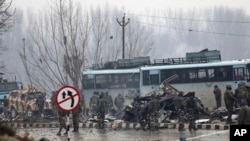Pakistan launched an intense diplomatic push to repel India’s efforts to isolate it after India blamed a Pakistan based group for an attack Friday in Kashmir killing more than 40 security personnel.
At least 70 to 80 ambassadors in Islamabad were briefed since Friday by Pakistan’s foreign office, according to diplomatic and other sources.
In the briefings, Pakistan questioned India’s motives for blaming it without a proper investigation, indicating that the attack may have been carried out by a group within India.
“There are people in India who want to make Pakistan and Kashmiris look bad,” some of the diplomats were told by Pakistani officials.
The officials briefing the ambassadors questioned the timing of the attack, insisting it was more damaging for Pakistan than India.
Friday’s attack came a day before Saudi Crown Prince Mohammad Bin Salman was expected to arrive in Islamabad with billions of dollars in investment to help the fledgling economy. It also came right before the meeting of an international Financial Action Task Force in Paris that is already scrutinizing Pakistan for its lax laws on terrorism funding.
Pakistan also told the ambassadors that the current Indian administration was trying to use anti-Pakistan rhetoric to gain votes in the upcoming elections and warned of the possibility of more attacks before polling starts in April.
India, for its part, has briefed at least 25 diplomats, including those representing the five permanent members of the U.N. Security Council (China, France, Russia, Britain and the United States), on Pakistan’s alleged support of Jaish-e-Mohammed, the group that claimed responsibility for the deadly attack, according to Indian media.
Masood Azhar, the leader of the group who was released from Indian custody in 1999 in return for the passengers of a hijacked Indian plane, has since been living in Pakistan.
Pakistan banned JeM in 2002 but security experts say it is allowed to operate under different names. The group is also on the Security Council sanctions list. However, efforts by India to have Azhar added to that list have been blocked by China, Pakistan’s longtime ally.
After the attack, U.S. National Security Adviser John Bolton tweeted that “Pakistan must crack down on JeM and all terrorists operating from its territory,” whereas Secretary of State Michael Pompeo tweeted, “Pakistan must not provide safe haven for terrorists to threaten international security.”
Indian Prime Minister Narendra Modi has promised an appropriate response to the attack.
“The terrorists and their supporters can try to hide all they want, but they will be punished,” he said at a rally. His administration has also indicated it had given the security forces “full freedom” to respond.
In 2016, after another attack on Indian security forces in Kashmir blamed on JeM, India carried out “surgical strikes” across the Line of Control, the de-facto border in the disputed region. While the strikes were considered cosmetic in their impact by most analysts on both sides, many fear a stronger response this time.
“The current situation has all the making of an India-Pakistan crisis. It's election year and Prime Minister Modi is going to use this attack to the hilt for domestic political gains,” according to Moeed Yusuf, the Associate Vice President for Asia in the Washington based U.S. Institute of Peace.
In a letter Monday to the U.N. secretary-general, Pakistan Foreign Minister Shah Mahmood Qureshi called on the United Nations to intervene.
“It is with a sense of urgency that I draw your attention to the deteriorating security situation in our region resulting from the threat of use of force against Pakistan by India.”
The two countries have fought four wars, three of them over Kashmir, and fears of another conflict between the two nuclear armed neighbors are high.
"There is a lot of outrage and anger in India," said Prabhu Dayal, a former Indian diplomat who has served in Pakistan, adding that Indians were aware of the "well established linkage" between JeM and Pakistan's intelligence agencies.
“Things have been so tense between India and Pakistan for the past few months that the room for error is literally zero,” said Yusuf.
Both India and Pakistan have recalled their high commissioners “for consultations.”
Meanwhile, Indian media reported attacks on Kashmiri students or businesses in various parts of North India. The Indian newspaper The Hindu reported that at least 100 Kashmiri students were forced to flee to Kashmir from other parts of India.








